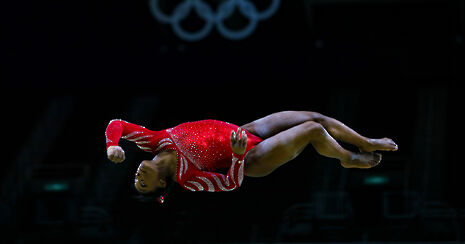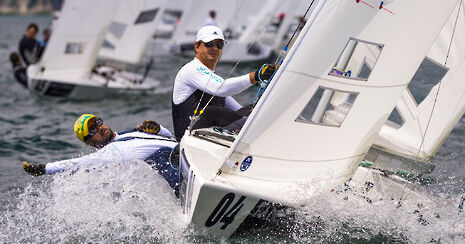Reflections on Rio: Celebrating the Inspirational
In the final part of a four-part series, Tom Higgins-Toon and Charlie Stone pay tribute to their favourite inspirational stories from Rio 2016

Unaffordable ticket prices, displaced local populations and a very hefty bill: Rio 2016 may have offered us golden beaches and clear blue skies, yet it remains to be seen whether Brazil has passed the Olympics test with flying colours.
What cannot be doubted, however, is the attitude of the athletes, for whom the Games represented the culmination of years of self-discipline and rigorous training regimes; as such, all deserve the recognition that participation at the highest stage warrants. Nevertheless, there are a select few who will live long in memory as inspirational figures who have overcome great adversity on their way.
The Olympic Refugee Team
Whether it brings to mind images of pirate ships, Gallic stereotypes or even old Dido numbers, the term “white flag” rarely takes a positive connotation. That is, until the opening ceremony of the Rio Olympics. Ten athletes, linked by their tremendous courage against adversity, waved the official white banner to a packed out Maracanã as the representatives of the inaugural Olympic Refugee Team.
That none of their athletes had a medal around their neck by the time of the closing ceremony is of no importance — the same was true for 119 other countries in Rio. Yet encouraging the world to view asylum seekers through a human lens of sporting achievement rather than numbers in an immigration debate will hopefully have, in the words of the UN Refugee Deputy High Commissioner, Kelly T. Clements, “changed the conversation” about those unfortunate enough to experience dictatorial regimes.
Crucially, their participation on the global stage does more than just changing our perceptions — it equally inspires confidence in the other 21.3 million refugees currently displaced in the world today. For the indefinable trauma that accompanies civil war, repression and familial separation does not end with repatriation in a safer part of the world. Indeed, a 2015 study by German psychotherapists concluded that half of Syrian exiles seeking asylum in Germany suffered flashbacks of traumatic events, with even more falling victim to mental illnesses such as depression and post-traumatic stress disorder.
Their participation in the Games was no panacea to the refugee crisis, yet five runners from South Sudan, two Syrian swimmers, two Congolese judokas, and an Ethiopian marathon runner all demonstrated how lacking citizenship is not the same as lacking identity.
Popole Misenga – 24 – Olympic Refugee Team – Judo (90kg)
Popole Misenga – one of the Olympic Refugee Team's Congolese judokas – delighted many by making it through to the round of 16 where, despite the encouragement of a partisan crowd, he lost a fiercely contested battle against the world number one, Gwak Dong-han.
Orphaned at six years of age following the murder of his mother during the Second Congo War, Misenga faced subsequent atrocities before his dramatic rise to the Olympic stage. After wandering alone in the rainforest for a week, he was rescued and taken to the capital Kinshasa, where he tried his hand at judo. As he pursued his Olympic dream, he endured acts of extreme barbarity at the hands of deplorable coaches: routinely locked up inside a cage after poor performances and on one occasion locked inside his hotel room for two days without food. Eventually, he escaped to the favelas of Rio during the 2013 World Judo Championship, held in Brazil.
Having not seen his family for 15 years, the problems are far from over for the former Congolese athlete, yet he remains remarkably optimistic for a man often stripped of his right to dignity: “If you can see me on television now, you can see that your brother is here in Brazil and alive and well”, he proclaimed at a press conference before the competition kicked off.
Let us hope that the competitors of the Refugee Team will help change some prejudices that persevere against those much less fortunate than ourselves. Yet, it should be remembered that it is not just the viewing public that these athletes strive to inspire, but rather all those displaced from their own home through no fault of their own. Or more succinctly, as Misenga explained before his first bout: “I will be competing for all refugees”.
Simone Biles – 19 – USA – Gymnastics
Simone Biles was one of the stars of the Rio Olympics, and that not solely down to her five-medal haul (four golds, one bronze). At the tender age of 19, Biles’ first Olympics saw her streets ahead of the other gymnasts; to the extent that some joked that these Games were a competition to see who could finish second.
And her success at such a young age was all the more awe-inspiring considering her life story, which was among the most difficult of all the athletes competing in Rio. With her biological mother suffering from serious drug and alcohol abuse and having never known her father, Biles was taken into care at five years old with her younger sister, Adria. After spending time in a foster home waiting for adoption, her grandfather, Ron, and his second wife eventually discovered what had happened and took Biles and her sister – two children they barely knew – into their own care. It was with her new ‘parents’ that the American teenager began to flourish as a gymnast, and with whom she emotionally celebrated every single medal she won at Rio 2016.

Zahra Nemati – 31 – Iran – Archery
Zahra Nemati’s Olympic story was a stunning tale of perseverance and determination. Formerly a taekwondo black belt, she spent her youth dreaming of competing in this discipline at the Olympics. Yet in 2003 – at the age of eighteen – Nemati’s spine was shattered when she was hit by a car, paralysing her from the waist down and confining her to a wheelchair.
However, Nemati refused to abandon her Olympic dream. Switching focus to archery, she won two golds at the London 2012 Paralympics – becoming the first Iranian women to win gold at either the Olympics or the Paralympics – and then qualified to take part in the Rio Olympics. In recognition of her incredible achievements, Nemati was chosen to be Iran’s flag bearer at the 2016 opening ceremony: a just reward for an athlete who never gave up despite discovering, just as she became an adult, she would never walk again.
Lars Grael – 52 – Brazil – Sailing (Did Not Compete)
Lars Grael did not compete at Rio 2016 because his sailing discipline – the "Star Class" – was voted out by the International Olympic Committee (IOC). His story, though, deserves to be mentioned.
A two-time Olympic medallist and world champion, Grael was one of Brazil’s leading athletes until a freak accident in 1998. During the national regatta, a drunk powerboat rider crashed into Grael’s boat, and its propeller severed his leg almost entirely. He had to undergo ten surgical operations until his leg was eventually amputated. But instead of quitting sailing, Grael switched focus to the Star Class (as it suited his limited agility) and has again become one of the world’s most successful sailors. He also founded a sailing school for state-educated children, which has subsequently produced a world champion sailor, Samuel Goncalves.
It was a controversial decision to take the Star Class away from the Olympics and, no matter the discipline's status, Grael’s determination in the face of adversity merits recognition.
 News / CUP announces funding scheme for under-represented academics19 December 2025
News / CUP announces funding scheme for under-represented academics19 December 2025 News / SU reluctantly registers controversial women’s soc18 December 2025
News / SU reluctantly registers controversial women’s soc18 December 2025 News / Cambridge welcomes UK rejoining the Erasmus scheme20 December 2025
News / Cambridge welcomes UK rejoining the Erasmus scheme20 December 2025 Features / Should I stay or should I go? Cambridge students and alumni reflect on how their memories stay with them15 December 2025
Features / Should I stay or should I go? Cambridge students and alumni reflect on how their memories stay with them15 December 2025 Film & TV / Timothée Chalamet and the era-fication of film marketing21 December 2025
Film & TV / Timothée Chalamet and the era-fication of film marketing21 December 2025









